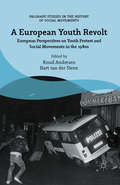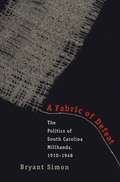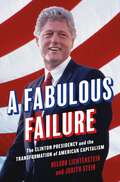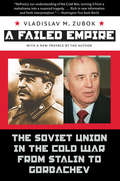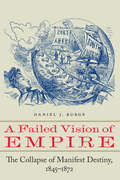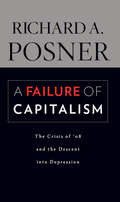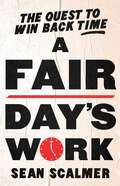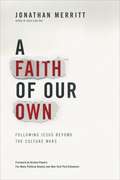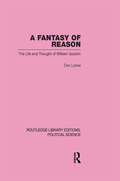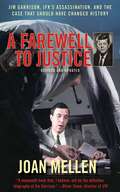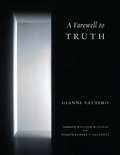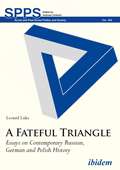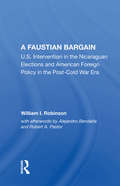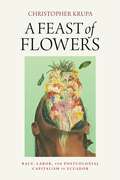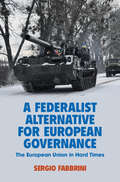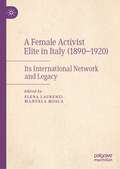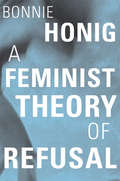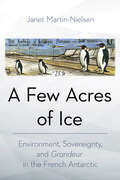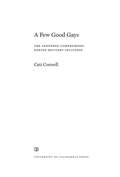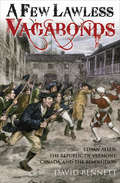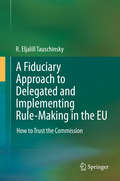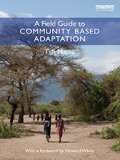- Table View
- List View
A European Youth Revolt: European Perspectives on Youth Protest and Social Movements in the 1980s (Palgrave Studies in the History of Social Movements)
by Bart van der SteenDuring the early 1980s, large parts of Europe were swept with riots and youth revolts. Radicalised young people occupied buildings and clashed with the police in cities such as Zurich, Berlin and Amsterdam, while in Great Britain and France, 'migrant' youths protested fiercely against their underprivileged position and police brutality. Was there a link between the youth revolts in different European cities, and if so, how were they connected and how did they influence each other? These questions are central in this volume. This book covers case studies from countries in both Eastern and Western Europe and focuses not only on political movements such as squatting, but also on political subcultures such as punk, as well as the interaction between them. In doing so, it is the first historical collection with a transnational and interdisciplinary perspective on youth, youth revolts and social movements in the 1980s.
A Fabric of Defeat
by Bryant SimonIn this book, Bryant Simon brings to life the politics of white South Carolina millhands during the first half of the twentieth century. His revealing and moving account explores how this group of southern laborers thought about and participated in politics and public power. Taking a broad view of politics, Simon looks at laborers as they engaged in political activity in many venues--at the polling station, on front porches, and on the shop floor--and examines their political involvement at the local, state, and national levels. He describes the campaign styles and rhetoric of such politicians as Coleman Blease and Olin Johnston (himself a former millhand), who eagerly sought the workers' votes. He draws a detailed picture of mill workers casting ballots, carrying placards, marching on the state capital, writing to lawmakers, and picketing factories. These millhands' politics reflected their public and private thoughts about whiteness and blackness,war and the New Deal, democracy and justice, gender and sexuality, class relations and consumption. Ultimately, the people depicted here are neither romanticized nor dismissed as the stereotypically racist and uneducated "rednecks" found in many accounts of southern politics. Southern workers understood the political and social forces that shaped their lives, argues Simon, and they developedcomplex political strategies to deal with those forces.
A Fabulous Failure: The Clinton Presidency and the Transformation of American Capitalism (Politics and Society in Modern America #155)
by Judith Stein Nelson LichtensteinHow the Clinton administration betrayed its progressive principles and capitulated to the rightWhen Bill Clinton was elected president in 1992, he ended twelve years of Republican rule and seemed poised to enact a progressive transformation of the US economy, touching everything from health care to trade to labor relations. Yet by the time he left office, the nation’s economic and social policies had instead lurched dramatically rightward, exacerbating the inequalities so troubling in our own time. This book reveals why Clinton’s expansive agenda was a fabulous failure, and why its demise still haunts us today.Nelson Lichtenstein and Judith Stein show how the administration’s progressive reformers—people like Robert Reich, Ira Magaziner, Laura Tyson, and Joseph Stiglitz—were stymied by a new world of global capitalism that heightened Wall Street influence, undermined domestic manufacturing, and eviscerated the labor movement. Robert Rubin, Larry Summers, and Al Gore proved champions of this financialized world. Meanwhile, Clinton divided his own party when he relied on Republican votes to overhaul welfare, liberalize trade, and deregulate the banking and telecommunications industries. Even the economic boom Clinton ushered in—which tamed unemployment and sent the stock market soaring in what Alan Blinder and Janet Yellen termed a “fabulous decade”—ended with a series of exploding asset bubbles that his neoliberal economic advisors neither foresaw nor prevented.A Fabulous Failure is a study of ideas in action, some powerfully persuasive, others illusionary and self-defeating. It explains why and how the Clinton presidency’s progressive statecraft floundered in a world where the labor movement was weak, civil rights forces quiescent, and corporate America ever more powerful.
A Failed Empire
by Vladislav M. ZubokIn this widely praised book, Vladislav Zubok argues that Western interpretations of the Cold War have erred by exaggerating either the Kremlin's pragmatism or its aggressiveness. Explaining the interests, aspirations, illusions, fears, and misperceptions of the Kremlin leaders and Soviet elites, Zubok offers a Soviet perspective on the greatest standoff of the twentieth century. Using recently declassified Politburo records, ciphered telegrams, diaries, and taped conversations, among other sources, Zubok offers the first work in English to cover the entire Cold War from the Soviet side. A Failed Empire provides a history quite different from those written by the Western victors. In a new preface for this edition, the author adds to our understanding of today's events in Russia, including who the new players are and how their policies will affect the state of the world in the twenty-first century.
A Failed Vision of Empire: The Collapse of Manifest Destiny, 1845–1872
by Daniel J. BurgeSince the early twentieth century, historians have traditionally defined manifest destiny as the belief that the United States was destined to expand from coast to coast. This generation of historians has posed manifest destiny as a unifying ideology of the nineteenth century, one that was popular and pervasive and ultimately fulfilled in the late 1840s when the United States acquired the Pacific Coast. However, the story of manifest destiny was never quite that simple. In A Failed Vision of Empire Daniel J. Burge examines the belief in manifest destiny over the nineteenth century by analyzing contested moments in the continental expansion of the United States, arguing that the ideology was ultimately unsuccessful. By examining speeches, plays, letters, diaries, newspapers, and other sources, Burge reveals how Americans debated the wisdom of expansion, challenged expansionists, and disagreed over what the boundaries of the United States should look like. A Failed Vision of Empire is the first work to capture the messy, complicated, and yet far more compelling story of manifest destiny&’s failure, debunking in the process one of the most pervasive myths of modern American history.
A Failure of Capitalism: The Crisis of ’08 and the Descent into Depression
by Richard A. PosnerThe financial and economic crisis that began in 2008 is the most alarming of our lifetime because of the warp-speed at which it is occurring. How could it have happened, especially after all that we’ve learned from the Great Depression? Why wasn’t it anticipated so that remedial steps could be taken to avoid or mitigate it? What can be done to reverse a slide into a full-blown depression? Why have the responses to date of the government and the economics profession been so lackluster? Richard Posner presents a concise and non-technical examination of this mother of all financial disasters and of the, as yet, stumbling efforts to cope with it. No previous acquaintance on the part of the reader with macroeconomics or the theory of finance is presupposed. This is a book for intelligent generalists that will interest specialists as well. Among the facts and causes Posner identifies are: excess savings flowing in from Asia and the reckless lowering of interest rates by the Federal Reserve Board; the relation between executive compensation, short-term profit goals, and risky lending; the housing bubble fueled by low interest rates, aggressive mortgage marketing, and loose regulations; the low savings rate of American people; and the highly leveraged balance sheets of large financial institutions. Posner analyzes the two basic remedial approaches to the crisis, which correspond to the two theories of the cause of the Great Depression: the monetarist—that the Federal Reserve Board allowed the money supply to shrink, thus failing to prevent a disastrous deflation—and the Keynesian—that the depression was the product of a credit binge in the 1920s, a stock-market crash, and the ensuing downward spiral in economic activity. Posner concludes that the pendulum swung too far and that our financial markets need to be more heavily regulated.
A Fair Day's Work: The Quest to Win Back Time
by Sean ScalmerThe length of the working day and the challenges of work–life balance are pressing issues for many Australians, as well as lively matters of public controversy. While the winning of the eight-hour day is celebrated as a past industrial achievement, contemporary discussions of working hours often overlook its rich history. Tracing 150 years of campaigns for rights and for the fair distribution of productivity gains, historian Sean Scalmer shows how these movements successfully reduced the length of the standard working week from 60 to 38 hours per week, and how economic, social and political shifts since the early 1980s have stalled this long-term progress. Today, industrial laws provide inadequate protection for excessive hours, and Australian women increasingly shoulder long hours of paid work with the bulk of unpaid domestic labour. This has produced a social crisis for all Australians, but is yet to inspire adequate political action. As debate over our working lives intensifies amid ongoing political, economic and technological challenges, Scalmer&’s labour of love on the history of work and play affords us a way to understand the past so we can win back our time—collectively.
A Faith of Our Own: Following Jesus Beyond the Culture Wars
by Jonathan MerrittEvery day, major headlines tell the story of how Christianity is attempting to influence American culture and politics. But statistics show that young Americans are disenchanted with a faith that has become culturally antagonistic and too closely aligned with partisan politics. In this personal yet practical work, Jonathan Merritt uncovers the changing face of American Christianity by uniquely examining the coming of age of a new generation of Christians.Jonathan Merritt illuminates the spiritual ethos of this new generation of believers who engage the world with Christ-centered faith but an un-polarized political perspective. Through personal stories and biblically rooted commentary this scion of a leading evangelical family takes a close, thoughtful look at the changing religious and political environment, addressing such divisive issues as abortion, gay marriage, environmental use and care, race, war, poverty, and the imbalance of world wealth. Through Scripture, the examples of Jesus, and personal defining faith experiences, he distills the essential truths at the core of a Christian faith that is now just coming of age.
A Fantasy of Reason (Routledge Library Editions: Political Science #29)
by Don LockeThis ‘philosophical biography’ gives an account of Godwin’s life and thought, and by setting his thoughts in the context of his life, brings the two into juxtaposition. It relates Godwin’s views on politics and morality, education and religion, freedom and society, to the events of his life, notably the revolution in France and its impact on radicalism and reaction in Britain and the parliamentary reforms of 1832.
A Farewell to Justice: Jim Garrison, JFK's Assassination, and the Case that Should Have Changed History
by Joan MellenWorking with thousands of previously unreleased documents and drawing on more than one thousand interviews, with many witnesses speaking out for the first time, Joan Mellen revisits the investigation of New Orleans district attorney Jim Garrison, the only public official to have indicted, in 1969, a suspect in President John F. Kennedy's murder.Garrison began by exposing the contradictions in the Warren Report, which concluded that Lee Harvey Oswald was an unstable pro-Castro Marxist who acted alone in killing Kennedy. A Farewell to Justice reveals that Oswald, no Marxist, was in fact working with both the FBI and the CIA, as well as with US Customs, and that the attempts to sabotage Garrison's investigation reached the highest levels of the US government. Garrison's suspects included CIA-sponsored soldiers of fortune enlisted in assassination attempts against Fidel Castro, an anti-Castro Cuban asset, and a young runner for the conspirators, interviewed here for the first time by the author.Building upon Garrison's effort, Mellen uncovers decisive new evidence and clearly establishes the intelligence agencies' roles in both a president's assassination and its cover-up. In this revised edition, to be published in time for the fiftieth anniversary of the president's assassination, the author reveals new sources and recently uncovered documents confirming in greater detail just how involved the CIA was in the events of November 22, 1963. More than one hundred new pages add critical evidence and information into one of the most significant events in human history.
A Farewell to Truth
by Gianni VattimoWith Western cultures becoming more pluralistic, the question of "truth" in politics has become a game of interpretations. Today, we face the demise of the very idea of truth as an objective description of facts, though many have yet to acknowledge that this is changing.Gianni Vattimo explicitly engages with the important consequences for democracy of our changing conception of politics and truth, such as a growing reluctance to ground politics in science, economics, and technology. Yet in Vattimo's conception, a farewell to truth can benefit democracy, exposing the unspoken issues that underlie all objective claims. The end of absolute truth challenges the legitimacy of policies based on perceived objective necessities-protecting the free market, for example, even if it devastates certain groups or classes. Vattimo calls for a truth that is constructed with consensus and a respect for the liberty of all. By taking into account the cultural paradigms of others, a more "truthful" society-freer and more democratic-becomes possible. In this book, Vattimo continues his reinterpretation of Christianity as a religion of charity and hope, freeing society from authoritarian, metaphysical dogmatism. He also extends Nietzsche's "death of God" to the death of an authoritarian God, ushering in a new, postreligious Christianity. He connects the thought of Martin Heidegger, Karl Marx, and Karl Popper with surprising results and accommodates modern science more than in his previous work, reconciling its validity with an insistence that knowledge is interpretive. Vattimo's philosophy justifies Western nihilism in its capacity to dispense with absolute truths. Ranging over politics, ethics, religion, and the history of philosophy, his reflections contribute deeply to a modern reconception of God, metaphysics, and the purpose of reality.
A Farther Shore: Ireland's Long Road to Peace
by Gerry AdamsHe’s been imprisoned, shot at, denounced, shunned, and banned, yet Sinn Féin president Gerry Adams remains resolute in his belief that peace is the only viable option for the Irish people. Adams led the oldest revolutionary movement in Ireland on an extraordinary journey from armed insurrection to active participation in government. Now he tells the story of the tumultuous series of events that led to the historic Good Friday Agreement as only he can: with a tireless crusader’s conviction and an insider’s penetrating insight. In vivid detail, Adams describes the harrowing attack on his life, and he offers new details about the peace process. We learn of previously undisclosed talks between republicans and the British government, and of conflicts and surprising alliances between key players. Adams reveals details of his discussions with the IRA leadership and tells how republicans differed, “dissidents” emerged, and the first IRA cessation of violence broke down. He recounts meetings in the Clinton White House, tells what roles Irish-Americans and South Africans played in the process, and describes the secret involvement of those within the Catholic Church. Then—triumphantly—this inspiring story climaxes with the Good Friday Agreement: what was agreed and what was promised. Gerry Adams brings a sense of immediacy to this story of hope in what was long considered an intractable conflict. He conveys the acute tensions of the peace process and the ever-present sense of teetering on the brink of both joyous accomplishment and continued despair. With a sharp eye and sensitive ear for the more humorous foibles of political allies and enemies alike, Adams offers illuminating portraits of the leading characters through cease-fires and standoffs, discussions and confrontations. Among the featured players are John Major, Tony Blair, Bill and Hillary Clinton, Jean Kennedy Smith, and Nelson Mandela. As the preeminent republican strategist of his generation, Gerry Adams provides the first comprehensive account of the principles and tactics underpinning modern Irish republicanism. And in a world where peace processes are needed more urgently than ever, A Farther Shore provides a template for conflict resolution.
A Fateful Triangle: Essays on Contemporary Russian, German, and Polish History (Soviet and Post-Soviet Politics and Society #184)
by Leonid LuksThe twentieth century began with a deep identity crisis of European parliamentarianism, pluralism, rationalism, individualism, and liberalism―and a following political revolt against the West’s emerging open societies and their ideological foundation. In its radicalism, this upheaval against Western values had far-reaching consequences across the world, the repercussions of which can still be felt today. Germany and Russia formed the center of this insurrection against those ideas and approaches usually associated with the West. Leonid Luks’s essays deal with the various causes and results of these Russian and German anti-Western revolts for twentieth-century Europe. The book also touches upon the development of the peculiar post-Soviet Russian regime that, after the collapse of the USSR, emerged on the ruins of the Bolshevik state that had been established in 1917. What were the determinants of the erosion of the “second” Russian democracy that was briefly established, after the disempowerment of the CPSU in August 1991, until the rise of Vladimir Putin? Further foci of this wide-ranging study include the specific geopolitical trap in which Poland—constrained by its two powerful neighbors—was caught for centuries. Finally, Luks explores the special relationship that all three countries of Central and Eastern Europe’s "fateful triangle" had with Judaism and the Jews.
A Father's Fight: Taking on Alex Jones and Reclaiming the Truth About Sandy Hook
by Robbie ParkerHow one father, determined to reclaim his daughter's memory, brought down Alex JonesOn December 14, 2012, Robbie Parker's daughter Emilie was killed at Sandy Hook Elementary, a tragedy that changed Robbie's life and our country forever. By the next day, Alex Jones was on air claiming the shooting was a hoax. So begins Parker's David and Goliath story, a tale of hope and resilience amid hatred and division. While Robbie and his family spent the next decade attempting to grieve, Jones's fans harassed them, calling them crisis actors. The hatred pushed Robbie inward, disconnecting him from the world and his family. Four years after Sandy Hook, an Infowars listener accosted Robbie three thousand miles away from Newtown, Connecticut, repeating the same lies Alex Jones had spread for years. Soon after, seventeen students were murdered at Florida's Marjory Stonemason Douglas High School. Robbie and his wife spoke with one of the victims' parents and learned they were also being bombarded with hateful messages. He realized he could no longer avoid this terrifying reality, and with the help of Sandy Hook parents, lawyers, and supporters, Robbie stood up to Alex Jones in court to heal and reclaim his daughter's memory. A Father's Fight is more than a memoir; it's a stirring portrait of an unbreakable human spirit. It's a testament to a father's love and perseverance in the face of insurmountable grief.
A Faustian Bargain: U.s. Intervention In The Nicaraguan Elections And American Foreign Policy In The Post-cold War Era
by William I RobinsonA penetrating analysis of the controversial U.S. role in the 1990 Nicaraguan elections-the most closely monitored in history-this book exposes the intervention in the electoral process of a sovereign nation by the Central Intelligence Agency, the Department of State, the National Endowment for Democracy, and private U.S.-based organizations. Robins
A Feast of Flowers: Race, Labor, and Postcolonial Capitalism in Ecuador
by Christopher KrupaWhen Ecuador's cut-flower industry took off in the mid-1980s, it rode a wave of international credit peddling and currency speculation that would lead countries of the Global South into successive debt crises and northern financial firms to fortune and dominion. By the start of the twenty-first century, as the Ecuadorian economy collapsed and its ties with international finance became strained, flower exporters rebuilt their businesses around the profitability of their indigenous labor force, drawing local communities deeply into new plantation systems taking over the highlands.In A Feast of Flowers, Christopher Krupa goes inside Ecuador's booming cut-flower industry to chronicle the ways its capitalist pioneers built a booming export industry around a racial ideology, turning indigenous people's purported differences into resources for industrial expansion. At the core of this racial system is a belief, central to postcolonial science and politics in Ecuador, in capitalism's unique capacity to change people's racial identity and to liberate oppressed populations from racial subordination. Krupa shows how such views not only guide how indigenous people are today incorporated into demanding labor systems in Ecuador's new export plantations, but also how indigenous minds and bodies became sites of study and intervention by scientists, politicians, and economic planners throughout the last century, all looking to change indigenous people in some way.Combining nearly two decades of ethnographic and historical research, A Feast of Flowers shows how aggressive capitalist expansion in postcolonial contexts may revive longstanding intersections between race and economy to facilitate new modes of dispossession under the guise of humanitarian intervention.
A Federalist Alternative for European Governance: The European Union in Hard Times
by Sergio FabbriniHow did the European Union (EU) deal with the crises of the 2010s and 2020s? These crises arose in policy realms that were the province of national governments, so the European Council was the driving institution for managing them. National governments were able to take decisions, but their decisions were contradictory and unaccountable, and regularly hindered by divisions between them. In order to manage a policymaking process dominated by the claims of national and sub-regional governments, Sergio Fabbrini argues that intergovernmental governance has had to transform the EU into an international organization. Fabbrini shows that differentiated integration would further distance the EU from the project of an 'ever closer union' and, on the basis of a comparative federalism approach, he proposes an alternative paradigm of a multi-tier Europe with a federalist core to balance national sovereignties and supranational authority.
A Female Activist Elite in Italy (1890–1920): Its International Network and Legacy
by Manuela Mosca Elena LaurenziThis book explores and traces the progressive activism and radical ideas of several elite women in Italy beginning in the early 20th century. It discusses the shared political culture that shaped the thinking and the activity of these women, mainly oriented towards political philanthropy and work, seen as the cornerstone of a comprehensive redefinition of gender relations. It also discusses the connections linking them to an international network of women involved in similar political actions and economic initiatives addressing women’s' interests, as well as their legacy for the next generations. With essays from a range of scholars, this book provides an interdisciplinary framework for understanding these activists and deals with methodological and historiographical issues in reconstructing women’s contribution to history.
A Feminist Theory of Refusal
by Bonnie HonigAn acclaimed political theorist offers a fresh, interdisciplinary analysis of the politics of refusal, highlighting the promise of a feminist politics that does not simply withdraw from the status quo but also transforms it. The Bacchae, Euripides’s fifth-century tragedy, famously depicts the wine god Dionysus and the women who follow him as indolent, drunken, mad. But Bonnie Honig sees the women differently. They reject work, not out of laziness, but because they have had enough of women’s routine obedience. Later they escape prison, leave the city of Thebes, explore alternative lifestyles, kill the king, and then return to claim the city. Their “arc of refusal,” Honig argues, can inspire a new feminist politics of refusal. Refusal, the withdrawal from unjust political and economic systems, is a key theme in political philosophy. Its best-known literary avatar is Herman Melville’s Bartleby, whose response to every request is, “I prefer not to.” A feminist politics of refusal, by contrast, cannot simply decline to participate in the machinations of power. Honig argues that a feminist refusal aims at transformation and, ultimately, self-governance. Withdrawal is a first step, not the end game. Rethinking the concepts of refusal in the work of Giorgio Agamben, Adriana Cavarero, and Saidiya Hartman, Honig places collective efforts toward self-governance at refusal’s core and, in doing so, invigorates discourse on civil and uncivil disobedience. She seeks new protagonists in film, art, and in historical and fictional figures including Sophocles’s Antigone, Ovid’s Procne, Charlie Chaplin’s Tramp, Leonardo da Vinci’s Madonna, and Muhammad Ali. Rather than decline the corruptions of politics, these agents of refusal join the women of Thebes first in saying no and then in risking to undertake transformative action.
A Few Acres of Ice: Environment, Sovereignty, and "Grandeur" in the French Antarctic
by Janet Martin-NielsenA Few Acres of Ice is an in-depth study of France's complex relationship with the Antarctic, from the search for Terra Australis by French navigators in the sixteenth century to France's role today as one of seven states laying claim to part of the white continent. Janet Martin-Nielsen focuses on environment, sovereignty, and science to reveal not only the political, commercial, and religious challenges of exploration but also the interaction between environmental concerns in polar regions and the geopolitical realities of the twenty-first century.Martin-Nielsen details how France has worked (and at times not worked) to perform sovereignty in Terre Adélie, from the territory's integration into France's colonial empire to France's integral role in making the environment matter in Antarctic politics. As a result, A Few Acres of Ice sheds light on how Terre Adeìlie has altered human perceptions and been constructed by human agency since (and even before) its discovery.
A Few Good Gays: The Gendered Compromises behind Military Inclusion
by Cati ConnellThe US military has done an about-face on gender and sexuality policy over the last decade, ending Don’t Ask, Don’t Tell, restrictions on women in combat, and transgender exclusion. Contrary to expectations, servicemembers have largely welcomed cisgender LGB individuals—yet they continue to vociferously resist trans inclusion and the presence of women on the front lines. In the minds of many, the embodied "deficiencies" of cisgender women and trans people of all genders puts others—and indeed, the nation—at risk. In this book, Cati Connell identifies the homonormative bargain that underwrites these uneven patterns of reception—a bargain that comes with significant concessions, upholding and even exacerbating race, class, and gender inequality in the pursuit of sexual equality. In this handshake deal, even the widespread support for open LGB service is highly conditional, revocable upon violation of the bargain. Despite the promise of inclusivity, in practice, the military has made room only for a "few good gays," to the exclusion of all others. But should equal access be the goal? How did we get from there to here? And where do we go next? In analyzing inclusion as a social movement aspiration, Connell shows that its steep price is exacted through the continued abjection of queered Others, both at home and abroad.
A Few Lawless Vagabonds: Ethan Allen, the Republic of Vermont, and the American Revolution
by David BennettThis surprising true story of Vermont&’s collusion with the British &“may be the best American Revolutionary War era book to come out in years&” (Military Review). This riveting work of political and military history provides an account of the three-way relationship between Ethan Allen, the Republic of Vermont (1777–1791), and the British in Canada during the American Revolution. Ethan Allen was a prime mover in the establishment of the Republic, then led the fight to maintain its independence from the &“predatory states&” of New Hampshire, New York, and Massachusetts; from the American Continental Congress; and from British attacks on the new state. In order to defend Vermont&’s independence, Ethan Allen even went so far as engaging in secret, unlawful negotiations with the British in Canada, aimed at turning Vermont into a &“separate Government under the Crown.&” The attempts of the Allen family to maintain Vermont&’s independence from its neighbors were unsuccessful: Vermont became the fourteenth state in 1791. A Few Lawless Vagabonds is the first systematic attempt, using archival sources, to show that the Allens were utterly serious in their aim to turn Vermont into a Crown colony, a project which came close to success in late 1781. The portrait of Ethan Allen that emerges in this book is not of a warrior hero of the American Revolution but of a successful Vermont nationalist who is justly celebrated as the principal founder of the State of Vermont—a rare combination of patriot and betrayer of the public trust.
A Fiduciary Approach to Delegated and Implementing Rule-Making in the EU: How to Trust the Commission
by R. Eljalill TauschinskyThis book focuses on the evaluation of delegated and implementing rule-making, based on Articles 290 and 291 TFEU. These articles have attracted considerable attention since their introduction in 2009, and their implementation is one of the most hotly debated questions in European Administrative Law. The book takes up this timely topic, discusses it in an innovative way and offers valuable new insights. Delegated and implementing acts are the most common form of EU legal acts. However, despite their ubiquity and relevance, it is unclear how the Commission’s powers to adopt these important acts relates to subjects’ democratic rights. Accordingly, the book explores the question of how the Commission’s powers to adopt delegated and implementing acts can be justified. The relationship between the Commission and the persons within the Member States who are directly affected by its rule-making should be seen, the book argues, as one of institutional trust, and as a result as a fiduciary relationship. The book begins by defining the theoretical conditions for a justificatory approach, before explaining the background and foundations of fiduciary law. It then links this theoretical perspective with the realities of delegated and implementing acts, describing how the various roles in fiduciary relationships map onto the rule-making process that produces delegated and implementing acts, and explains how the fundamental tenet of fiduciary relationships – loyalty – can be included in the rule-making process.
A Field Guide to Community Based Adaptation
by Tim MageeThe world's poor will be the most critically affected by a changing climate—and yet their current plight isn't improving rapidly enough to fulfill the UN’s Millennium Development Goals. If experienced development organizations are finding it difficult to solve decades-old development problems, how will they additionally solve new challenges driven by climate change? This book illustrates how including community members in project design and co-management leads to long-lasting, successful achievement of development and adaptation goals. This field guide provides a system of building block activities for staff on the ground to use in developing and implementing successful adaptation to climate change projects that can be co-managed and sustained by communities. Based on years of use in 129 different countries, the techniques illustrated in this field guide use a step-by-step progression to lead readers through problem assessment, project design, implementation, and community take over. The book equips development staff with all the tools and techniques they need to improve current project effectiveness, to introduce community based adaptation into organizational programming and to generate new projects. The techniques provided can be applied to broad range of challenges, from agriculture and soil and water challenges, to health concerns, flood defences and market development. The book is supported by a user-friendly website updated by the author, where readers can download online resources for each chapter which they can tailor to their own specific projects. This practical guide is accessible to all levels of development staff and practitioners, as well as to students of development and environmental studies.
A Field Guide to Ghost Guns: For Police and Forensic Investigations
by Robert E. WalkerWhile it has always been legal for a citizen in the United States to manufacture their own firearm, the sale and distribution of such items is illegal under current U.S. law. The primary impediment to individuals making their own weapons has been access to the tooling and machinery required to convert raw materials into finished parts for assembly. However, in the last fifteen years this paradigm has changed drastically. Home builders and companies have emerged to support individuals who choose to produce their own firearm. Kits with receivers and gun components are available for hobbyists, as are 3-D printable gun designs, downloadable from the Internet in some cases. This phenomenon has led to the term ghost guns: firearms whose existence is not reported to any third party and therefore whose existence is unknown and, largely, untraceable. A Field Guide to Ghost Guns: For Police and Forensic Investigators provides a useful brief for field investigators on the technical aspects of the self-made firearm, so-called "ghost guns. The first book to focus on the emergent issue of ghost guns, coverage addresses the history of firearms making and manufacture in the U.S.—including regulated and nonregulated manufacturing, details firearm components and accessories, how to assemble a Firearm, an overview of common Types of ghost guns, and investigative considerations. Though there have been increased calls to regulate guns in the wake of numerous mass shootings, the proliferation of ghost guns—and their increasing use in crimes—would likely require additional laws and regulatory measures. Since there are few knowledgeable firearm practitioners in the field, who can render qualified opinions on the subject, author Robb Walker has taken a practical, pragmatic approach to the topic. The book defines terminology, provides photographs, and explains the concepts surrounding homemade firearm in clear, easy to understand terms. Key Features: Addresses the technology and technical aspects in creating, assembling, and/or modifying homemade firearms—both printable and assembled from pre-fabricated components Discusses the rationale and motivations behind making one’s own firearm Outlines what is currently legal and illegal under U.S. law, providing indicators for investigators for illegally configured firearms A Field Guide to Ghost Guns addresses the pressing need for a practical reference on the topic. The book provides police investigators and forensic ballistics experts a useful aid to understand legal aspects and to identify ghost guns, and the paraphernalia—tooling and machinery, and otherwise—indicative of gun making in a non-formal, factory setting.
